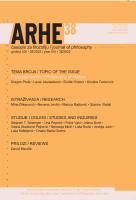Rascepljeno Ja fenomenološke egologije
The Split I of Phenomenological Egology
Author(s): Andrija JurićSubject(s): Contemporary Philosophy, German Idealism, Philosophy of Mind, Phenomenology
Published by: Филозофски факултет, Универзитет у Новом Саду
Keywords: pure I; I-splitting; reflection; disinterested spectator; egology;
Summary/Abstract: The concept of I is one of the central concepts of Husserl’s phenomenology. The main problem of the I is the possibility of grasping it. If we approach it from the angle of (self)reflection, then in I-reflection we have a case of the appearance of “two” I’s–the reflecting, the subject of reflection and the reflected, the object of reflection. In releasing from the object-orientation of the stream of experience, “immersion” into objects and thematizing the I, we are faced with the paradox that reflection “splits” the I. The difficulty becomes the restitution of (anew) identity between the reflecting and the reflected I. It, distancing itself from itself in self-observation, at the same time maintains the continuity of self-identity with its object. Thus, the wider problems of transcendental phenomenology, such as the relationship between the transcendental and concrete ego, and the paradox of subjectivity, are based on a deeper split between the reflecting I-Subject and the reflected I-Object, that is, on the paradox of reflection. The problem of I-splitting will be considered in three distinct cases: acts of representification, reflection and considering the disinterested spectator. The paper will conclude that despite the emphasis on reflection in the grasping of the I, Husserl’s notion of the I-splitting offers a potential solution to the critique of the reflection model established with Fichte.
Journal: Arhe
- Issue Year: 2022
- Issue No: 38
- Page Range: 345-370
- Page Count: 26
- Language: Serbian

